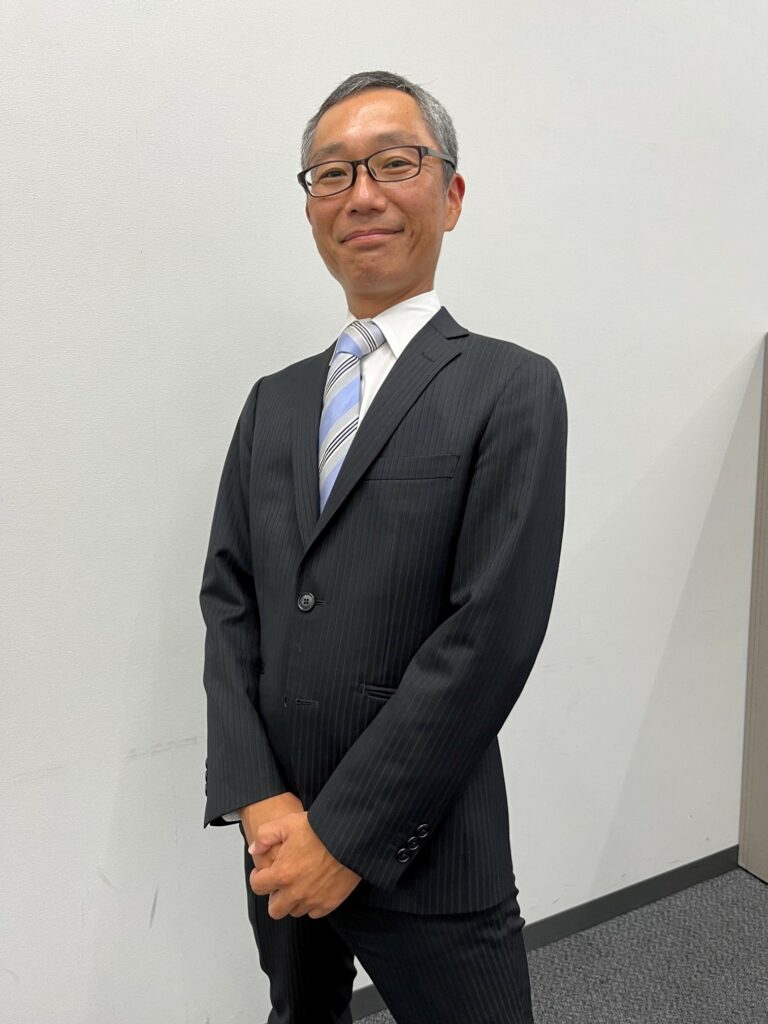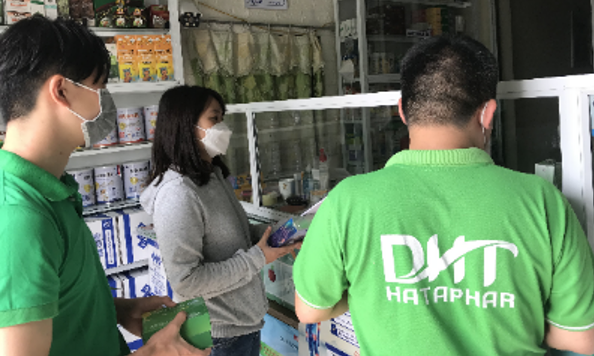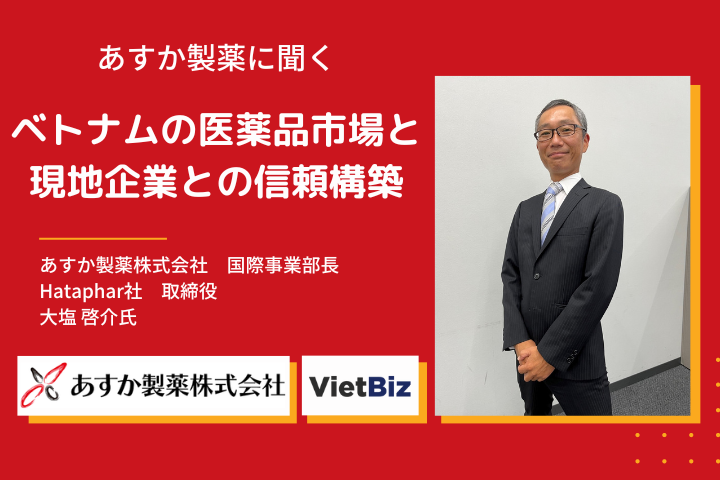- Introduction
- What were the deciding factors that allowed you to make the decision to enter the Vietnamese market?
- Cooperative Business with Hatay Pharmaceuticals
- Difficulties in the Vietnamese Pharmaceutical Market
- Future growth and potential of Vietnam’s medical and pharmaceutical market
- Success Factors of Asuka Pharmaceutical’s Business in Vietnam
- After the interview (Consideration as VietBiz)
Introduction
Vietnam has attracted attention as a manufacturing base for pharmaceuticals due to its inexpensive labor costs, but recently it has also become a promising consumer market for pharmaceuticals. The main reasons for this are not only population growth and rising income levels due to economic development, but also an increase in lifestyle-related diseases, represented by Non-Communicable Diseases (NCDs). The structure of diseases in Vietnam has changed significantly with economic development.
The average healthy life expectancy in Japan is 76 years, while in Vietnam it is 66.6 years. Currently, Vietnamese people can live in good health for 10 years less than the Japanese. The growth potential for medical and pharmaceutical products in Vietnam is very large.
One such Japanese company working to develop Vietnam’s pharmaceutical industry is Asuka Pharmaceutical Co.
In August 2020, Asuka Pharmaceutical signed a share transfer agreement with Ha Tay Pharmaceutical Joint Stock Company (Hanoi, “Hataphar”), a Vietnamese pharmaceutical company, and acquired 24.9% of its shares. (Hanoi, Vietnam; “Hataphar”; referred to in this article as “Ha Tay Pharmaceutical”) and acquired 24.9% of its shares in the company.
VietBiz, a Vietnam economy and business information site operated by a management consulting firm specializing in Vietnam, recently conducted an interview with Keisuke Oshio, General Manager of International Business Division, International Business Department, Asuka Pharmaceuticals and Director of Ha Tay Seiyaku, and Koichiro Tatebayashi, who is on secondment from Asuka Pharmaceuticals to Ha Tay Seiyaku, to learn more about Asuka’s latest initiatives and their experiences in collaborative projects in Vietnam.

What were the deciding factors that allowed you to make the decision to enter the Vietnamese market?
Not only Vietnam, but the Southeast Asian pharmaceutical market as a whole is growing, for example, the Philippines and Indonesia, which have large populations, are also growing noticeably.
ーWhat were the reasons for deciding on Vietnam as the location for your company’s expansion? In terms of future growth potential, I think there were other options besides Vietnam.
Mr. Oshio
The increase in lifestyle-related diseases is remarkable in Vietnam, and we believed that there were new medical needs in the country. Other factors such as political stability, relatively good security, and the fact that Vietnam is a Buddhist country like Japan led us to the conclusion that we should first target Vietnamese companies.
ーWhat kind of business are you developing in Vietnam? In Japan, Asuka Pharmaceutical is focusing on gynecological diseases.
Mr. Oshio
In the Vietnam business, generic drugs will be the main focus. With “supplying international-level pharmaceutical products to Vietnam and Southeast Asia” as one of the major concepts, the two companies are currently working on the construction of a PIC/S-GMP-standard plant that will be responsible for manufacturing pharmaceutical products for Southeast Asia and expanding the product lineup by transferring our product technologies to the plant.

According to Vietbiz’s findings, Vietnam’s pharmaceutical market is expected to grow from US$7.7 billion in 2021 to US$16.1 billion by 2026. The generics market is also significant: in 2018, the market for patented drugs in Vietnam was worth US$12 billion, while the generics market was worth US$32 billion.
Cooperative Business with Hatay Pharmaceuticals
As mentioned earlier, ASKA Pharmaceuticals has acquired a 24.9% stake in Ha Tay Pharmaceutical, a Vietnamese pharmaceutical company. The two companies aim to achieve synergistic effects between Hatai’s local sales force in Vietnam and ASKA’s development and technological know-how, and to develop both companies.
ーDid you encounter any difficulties, such as differences in business practices, in your cooperative business with Vietnamese companies? In general, we are aware that many Japanese companies face challenges in cooperative projects with Vietnamese companies.
Mr. Oshio
I have realized that there are more differences in the way of thinking and methods for drug development and quality control than I had expected. Because we did not have a firm understanding of each other’s values, discussions at meetings often did not go well. I felt that in order to understand the Vietnamese standard approach to quality, it was necessary to visit the site and see it with my own eyes, and to talk directly with the person in charge of the site.
ーWe are aware that communication is one of the biggest challenges for Japanese companies.
Mr. Oshio
“In some respects, we are having a little difficulty because the official language is Vietnamese. Although the number of people in Vietnam who can speak English is increasing, especially among young people, there are many people, especially older people, who can only speak Vietnamese. Initially, we handled this through an English interpreter, but in order to more reliably convey the correct nuances, we hired Vietnamese personnel who are fluent in Japanese. This has pretty much dispelled any concerns we had about communication.”

Quality standards in Vietnam, not limited to pharmaceuticals, are relatively lower than those in Japan in almost all areas. For example, vegetables and fruits harvested in the agricultural industry are transported at room temperature, resulting in a large amount of loss, but this is tolerated. The same difference in thinking can be seen in the production of pharmaceuticals.
In terms of language, there has indeed been an English boom in Vietnam recently, and the number of families sending their children to English cram schools is rapidly increasing. While the number of English speakers is increasing among the younger generation, there are not that many English speakers among the middle-aged and older generation, who are the executives of companies.
Difficulties in the Vietnamese Pharmaceutical Market
The current situation is that not only in pharmaceuticals, but also in Vietnam, legal regulations are ambiguous and it is often difficult to make business decisions. The vagueness of the legal provisions often creates a gray zone, which is a challenge often faced in business development in Vietnam.
ーWere there any difficulties as a pharmaceutical industry?
Mr. Oshio
Currently, a major issue in the pharmaceutical industry is the registration of pharmaceutical products. In Vietnam, the registration of pharmaceutical products must be renewed five years after they are launched on the market. This renewal is also very difficult, and I hear that there are not enough staff at the approval and review agencies. Last year, due to the scandal at the Ministry of Health, the renewal of about 10,000 products is said to have been halted. Automatic renewal was implemented as a stopgap measure, but no fundamental solution has been reached, so I believe that registration and renewal of this drug is a difficult task.
ーAre there any other challenges unique to the Vietnamese pharmaceutical industry?
Mr. Tatebayashi
I think one issue that needs to be addressed in the long term is the low level of medical care in rural areas. I believe that raising the level of medical care in rural areas will lead to the expansion of our market.
In Vietnam, the head of state, Party General Secretary Nguyen Phu Trong, has been actively promoting the fight against corruption; in June 2022, the former Minister of Health was arrested after being expelled from the Communist Party for corruption. In addition to the former Minister of Health, many other officials have been arrested, including the former mayor of Hanoi, indicating a trend toward cleaning up within the Communist Party and the industry. Expectations are high for legislation related to drug registration and renewal.
Future growth and potential of Vietnam’s medical and pharmaceutical market
Finally, we also interviewed the Vietnamese medical and pharmaceutical industry on its future prospects.
ーWhat trends do you see in the future for the Vietnamese pharmaceutical market?
Mr. Oshio
Although antimicrobial agents are the mainstream in Vietnam today, we believe that the market for antimicrobial agents will shrink, as in other developed countries, due to the problem of resistant bacteria. In recent years, diseases caused by lifestyle-related diseases such as diabetes have become the leading cause of death in Vietnam, and I believe that drugs related to lifestyle-related diseases will become a major trend.
Mr. Tatebayashi
Vietnam originally had a significant number of independently owned pharmacies, but the expansion of modern drugstore chains, such as Long Chau and Pharmacity, is also a major trend.
In the 1990s, deaths from infectious diseases accounted for 26% of deaths in Vietnam, but by 2017 this had dropped to 10.5%.The data also reads that lifestyle-related diseases are on the rise, with non-communicable diseases such as cardiovascular disease accounting for a larger proportion of deaths in Vietnam in 2017.
In addition, the increase in lifestyle-related diseases in Vietnam is not only a challenge for the adult age group. The obesity rate among children in urban areas such as Ho Chi Minh City has also increased about 10-fold over the past decade.
Drugstore chains are also expanding rapidly in Vietnam. The chain Long Chau, mentioned by Tatebayashi, has increased the number of stores by about 20 times in the four years from 2018 to 2021.
With economic development, Vietnam’s distribution pattern is expected to gradually shift from traditional trade to modern trade, which is expected to be a tailwind for Japanese companies.
Success Factors of Asuka Pharmaceutical’s Business in Vietnam
Through this interview, I realized that the key to Asuka Pharmaceutical’s success in Vietnam is the relationship of trust with Hatay Pharmaceutical.
ーDo you have any specific examples of your efforts in building trust with Hatay Pharmaceuticals? We would like to hear about any examples that would be helpful to other Japanese companies.
Mr. Oshio
We have provided full support for the construction of Hatay Pharmaceutical’s plant and any other projects that the client was unsure about or that were lagging behind in progress. By repeatedly removing obstacles, we have succeeded in building a relationship of trust that “if you don’t understand something, just ask Asuka.
ーConversely, what have you learned from Vietnamese companies? Were there any good points of Vietnamese companies that Japanese companies should incorporate?
Mr. Oshio
It is a place where many companies have active women. Many women are working in management positions at Hatye Seiyaku as well. We are also working on increasing the ratio of women in management positions, but we still have a long way to go. I think Vietnam is more advanced in terms of women’s advancement in society.

According to the Gender Gap Index 2022 published by the World Economic Forum, Japan ranks 116th out of 146 countries, while Vietnam ranks 83rd.
This gender gap index is calculated from each country’s scores in four areas: “Economy,” “Politics,” “Health,” and “Education. Comparing only the “economy” field, which represents social advancement, wage disparity, etc., Japan ranks 121st, while Vietnam ranks 31st.
Of course, there are still gender equality issues in Vietnam, but the fact that Vietnam is more advanced than Japan in terms of women’s advancement in society is a fact that is reflected in the data.
After the interview (Consideration as VietBiz)
From this interview, we could see that Asuka Pharmaceutical has achieved good success in the early stages of cooperative business in Vietnam; Vietbiz has helped many Japanese companies to expand their business in Vietnam, but there have never been so many cases where a trusting relationship has been established as smoothly as in Asuka Pharmaceutical’s case.
Asuka Pharmaceutical continues to face difficult phases such as the construction of a new plant, registration and renewal of pharmaceuticals, and confusion caused by the scandal at the Ministry of Health, but it was felt that Asuka Pharmaceutical’s flexibility and trusting relationship with Hatay Pharmaceutical were the key factors behind the company’s ability to clear these difficulties. As for the future of ASKA Pharmaceuticals in Vietnam, we believe that the real work will begin after the construction of the new plant is completed. We would like to keep a close eye on Asuka Seiyaku’s trend of manufacturing and selling Japanese quality pharmaceutical products in Vietnam.
【関連記事】他のインタビュー記事やベトナムの医療分野については、以下をご覧ください。
about:blank








